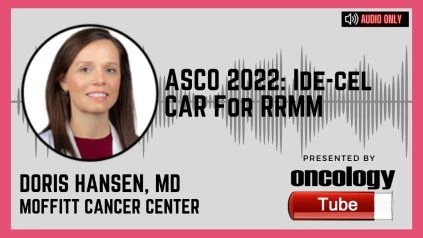Doris Hansen, MD, Assistant Member in the Moffitt Cancer Center Department of Blood and Marrow Transplant and Cellular Immunotherapy at Moffitt Cancer Center. In this video, she speaks about the ASCO 2022 Abstract – Idecabtagene vicleucel (Ide-cel) chimeric antigen receptor (CAR) T-cell therapy for relapsed/refractory multiple myeloma (RRMM): Real-world experience.
Origins:
Ide-cel, a BCMA-directed CAR T-cell therapy, was approved by the FDA on March 26, 2021, for the treatment of RRMM after four prior lines of therapy. We looked at the real-world outcomes of patients who received standard-of-care ide-cel under a commercial FDA label.
Methodology:
Independent of the company, ten US academic centers supplied data to this initiative. As of 1/10/2022, 138 individuals had been leukapheresed, with 6 cases of overall manufacturing failure (4 percent ). The study population for this retrospective analysis consists of 108 patients who were infused 30 days prior to the data cut off.
Outcomes:
The table compares the study population to the key KarMMa-1 experiment (Munshi et al, NEJM 2021). Patients in our research were less likely (77%) to have an ECOG PS of 0/1 and more likely to be penta-refractory (41 percent ). 67 percent of patients would not have been eligible for KarMMa. Co-morbidities (28 percent), cytopenias (22 percent), past therapy with alloSCT/CAR-T/other BCMA therapy (19 percent), CNS myeloma/non-measurable disease/plasma cell leukemia (13 percent), and fitness were the most common reasons for ineligibility (> 1 cause un 22 percent of patients) (12 percent ). Bridging treatment was administered to 81% of patients. The toxicity was comparable to KarMMa-1. Cytokine release syndrome (CRS) was observed in 82 percent (> grade 3: 4 percent) of patients and immunological effector cell-associated neurotoxicity syndrome (ICANS) in 15 percent (> grade 3: 5 percent). Tocilizumab and steroids were utilized by 72% and 25% of patients, respectively. Infections were found in 34% of the patients. In 104 patients, the reaction on day 30 could be evaluated. Response rates were as follows: partial response, 83%; very excellent partial response, 64%; and full response (CR), 34%. By the data cut-off, 11% of patients had died, 7 from illness progression, and 5 from other reasons (1 grade 5 CRS, 1 hemophagocytic lymphohistiocytosis, 1 progressive neurological weakness, 2 COVID-19).
Observations:
The real-world outcomes of ide-cel CAR T-cell treatment for RRMM are described in this multicenter retrospective research. Despite the fact that more patients in the real-world scenario are penta-refractory and less fit than in the pivotal KarMMa study, safety and 30-day responses (overall response rate: 83 percent, CR: 34 percent) are comparable to the clinical trial population. The investigation is still underway, and more information will be disclosed.

